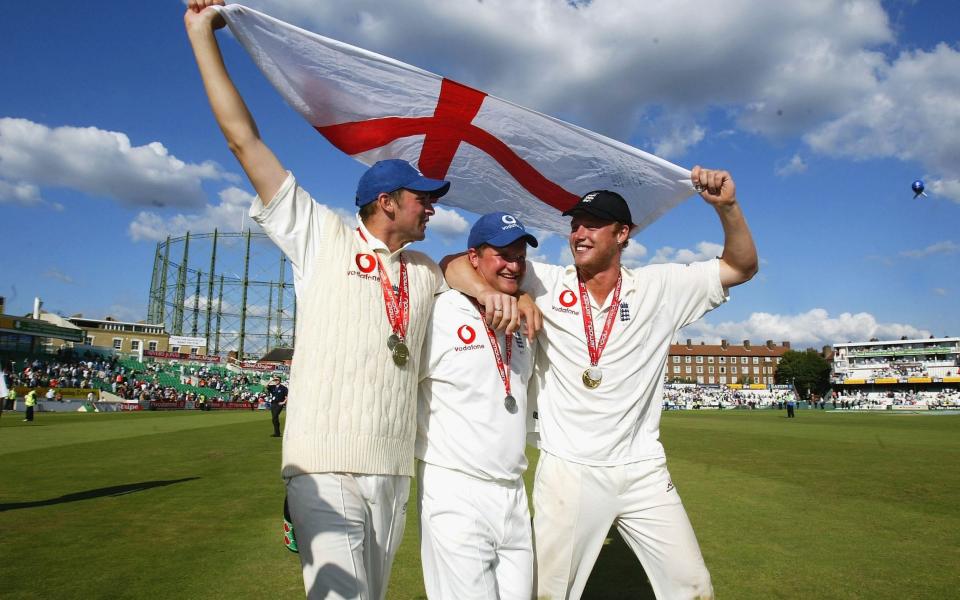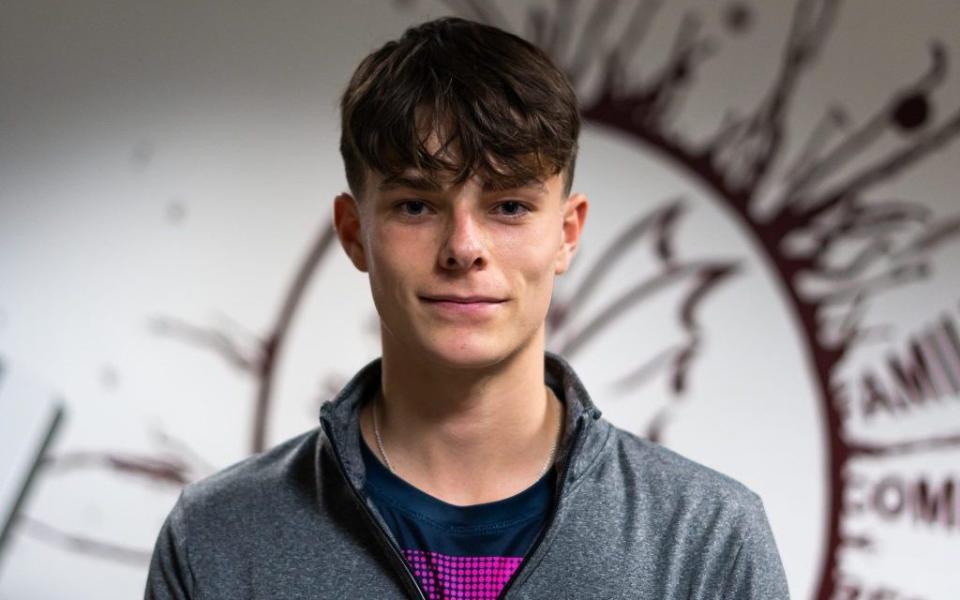
All it took was three blows for Rocky Flintoff to set social media ablaze. Dipping his head as he pulled the ball, with the power and timing to launch it over midwicket, Flintoff crunched three sixes for Lancashire second XI last week. The mere act of releasing the clips made comparisons with his father, Andrew, irresistible. Rocky then backed up his half-century against Durham with a century against Warwickshire on Tuesday.
“He is a proper chip off the old block,” says Mark Garraway, who worked with Flintoff senior when he was England assistant coach from 2006-09, and is now director of cricket at Millfield School and a regular on the youth cricket circuit. “The way that front leg came up it just reminded me very much of Freddie’s swivel pull. You could be watching Fred hit the likes of Brett Lee back in 2005. It was very similar.”
Rocky Flintoff is part of a trend. Many of English cricket’s most famous names, including several children of the heroes of the 2005 Ashes, are making their way in the game. To the Flintoffs – Rocky, 16, and older brother Corey, who is 18 and also plays for Lancashire second eleven – can be added Michael Vaughan’s son Archie, 18, who is impressing with Somerset and well-placed to earn a professional deal. Steve Harmison’s son, Charlie, 16, is a fast bowler in the Northumberland set-up.
Move away from just the class of 2005, and the shires are dotted with children of former England players. Joshua de Caires, the son of Michael Atherton, is impressing as an off spinning allrounder at Middlesex and has already been called up by England Lions. England’s U-19 World Cup squad this year included two sons of international cricketers: Luc Benkenstein, the son of Dale, who represented South Africa; and Haydon Mustard, who is an explosive keeper-batter like his father Phil.
Familiar surnames passing down the generations is nothing new: in England and beyond, cricket has always been a deeply familial game. Of the total of 713 England Test cricketers, 159 – almost a quarter – have either had a father, uncle or brother who represented the country, updating figures compiled by Telegraph Sport’s Scyld Berry in his book Cricket: The Game of Life.
Many of the children of the 2005 generation spent their first years playing with their dads, and other England cricketers, on outfields around the world. Garraway recalls throwing balls to a two-year-old Archie at the Basin Reserve in New Zealand.
“The kids end up spending a lot of time at cricket grounds,” Garraway says. “There is a natural link to it because we spend so much time engaged with that. And it is a sport that people get very passionate about. They’ve had some good experiences, because that’s what you want in sport, isn’t it?”
SECOND XI: Fifty for 17-year-old Archie Vaughan at Taunton Vale but Somerset not having the best time of it against Worcestershire
SCORECARD / STREAM / CLIPS ⤵️⤵️⤵️#WeAreSomerset
— Somerset Cricket
(@SomersetCCC) September 13, 2023
Cricket’s idiosyncrasies make family a particularly important route into the game. The challenge of learning the rules, and being accustomed to a sport that could last days, is far easier for those steeped in cricket from birth. Seeing their dads idolised might also encourage children to try and follow them.
“Kids are likely to be aware that their pro-athlete parent has a special status,” says Dom Malcolm, Professor of Sociology of Sport at Loughborough University. Being a professional athlete – especially a cricketer, with the travel it entails – will dominate family life far more than normal nine-to-five jobs. “Children of pro-athletes are likely quite immersed in the world of sport from an early age and consider it a realistic career goal.”
Easy access to facilities, and family tolerance for this curious game, can accelerate a child’s development in their formative years. But passion on the cricket field cannot be forced; reaching the top demands desire from within. Vaughan consciously sent Archie away from the family when he was 14, keen not to be an overbearing influence.
“He loves his cricket and is always wanting to learn,” Steve Harmison says of his son Charlie, joking: “Just doesn’t listen to his dad too much.”
Atherton is “very good at keeping his space,” De Caires has said. “It’s something I’m obviously immensely proud of my dad for, but I’m happy just getting on with my game.”
Training time and coaching alone is not enough to make it in any sport; the ’10,000 hour rule’ is neither necessary nor sufficient for any aspiring athlete. Kerry Packer, the founder of World Series Cricket, proved as much with his son James. The young James played cricket on outfields and in corridors with many of the best players in the world. His father then hired a private coach, the former Test cricketer Barry Knight, and installed an early model of a bowling machine to try and make James into a professional. It didn’t work.
Here, then, lies the essential contrast between sport and many other industries. Other jobs can be passed down the family, just as Packer senior did with his business interests to James. Sports success cannot.
Yet sons of cricketers do have a significant advantage over even the young Packer: their genes. To see Rocky Flintoff swatting sixes, or Charlie Harmison, who is already 6ft 4in and now aims to bulk out, is to see two young cricketers who have physiques that give them a chance to replicate their brilliant fathers. Archie’s cover drive and back foot drive are said to evoke Michael’s elegant strokes. While Archie has impressed Garraway as Millfield captain too, his style better resembles “the solidity of Andrew Strauss” than his dad’s more adventurous approach.

For the kids of the 2005 generation in one way the landscape has changed from children of past greats. Players in the 1990s, and especially the 2000s, were the first to make serious money from cricket. In many cases, this allows them to send their children to independent schools with outstanding cricket programmes. Archie Vaughan is at Millfield, attending the school after being wowed by the cricket facilities when his dad did some coaching there. Corey and Rocky Flintoff attended Manchester Grammar School; former England cricketer Mark Ealham’s son Tommy, on the books at Surrey, attended Cranleigh School.
Those surnames, and the memories that they evoke, bring their own pressures. Yet Garraway observes that, especially in a world as tight-knit as elite youth cricket, boys become used to dealing with comparisons with their dads. “They’ve never known anything different. They’ve always been associated with it. By the time they get to this age, they’re quite well-accustomed to dealing with that.”
Should England once again field a team with a Flintoff, a Harmison and a Vaughan, their parents will have played a significant role: through imbuing a love of the game, even if not consciously, and helping in the genetic lottery too. But cricket teams care not about a player’s surname, only the runs and wickets that they bring. If the children of 2005 go some way to emulating their illustrious dads, it will be a testament to their own talent and hard work.
Article courtesy of
Source link